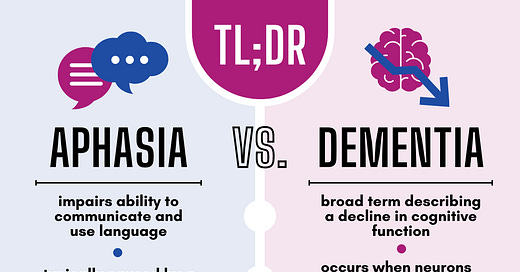3 minute read
Though they both involve brain function, dementia and aphasia are two separate things. Dementia is a broad term used to describe a decline in cognitive function that can have multiple causes and typically presents with symptoms of memory loss or confusion. It is not a disease, but rather, is a broad description of neurological symptoms and may be a symptom of disease. Symptoms may include memory loss, problems with planning or organization, or confusion. Different forms of dementia, such as Alzheimer’s Disease or Huntington’s Disease, have specific causes, but typically neuron death is involved. Dementia is more common in older adults, but it is not a normal part of the aging process. What’s the difference between dementia and aphasia?
Aphasia occurs when the language areas of the brain are damaged and leads to difficulties with communication. The most common causes of aphasia are stroke or brain injury, and there is a chance of it naturally resolving as the brain heals.
There are multiple types of aphasia with the most common two types named after language centers in the brain, Broca’s aphasia, and Wernicke’s aphasia. Broca’s aphasia is also known as nonfluent aphasia and results in the individual speaking in short or incomplete sentences. Wernicke’s aphasia or fluent aphasia presents as the individual speaking in long sentences using made-up or incorrect words so the sentences don’t communicate information.
If aphasia doesn’t resolve on its own, speech therapy can help individuals learn to communicate in new ways or strengthen any remaining language skills. Often speech therapy involves friends or family so everyone learns new strategies for communication.
Primary progressive aphasia (PPA) is a progressive form of aphasia that impacts a person’s language ability and is caused by tissue loss in the language areas of the brain. PPA can be caused by inherited genetic mutations or can be caused by other neurodegenerative diseases like Alzheimer’s Disease. Alzheimer’s does not always cause aphasia, but it can if it causes brain tissue deterioration in the language areas of the brain. PPA presents as a loss of language ability and gradually worsens over time until some people lose all ability to speak or understand language. There is no cure for PPA, but speech therapies can help people find new ways to communicate or adapt to the language loss.
There is no cure for dementia, but medications can help with the symptoms. Gene therapy is a growing area of study that tries to improve brain function by introducing genes or other molecules into the brain. These genes can compensate for mutated versions that contribute to the loss of cognitive function, and the molecules can influence the proteins that are made in the brain to help control the environment. With this intervention, the brain may be better able to make proteins to improve neuron health so the issue will be addressed directly instead of managing the symptoms. However, gene therapy trials are ongoing and it is unclear when they will be widely available to the public.




